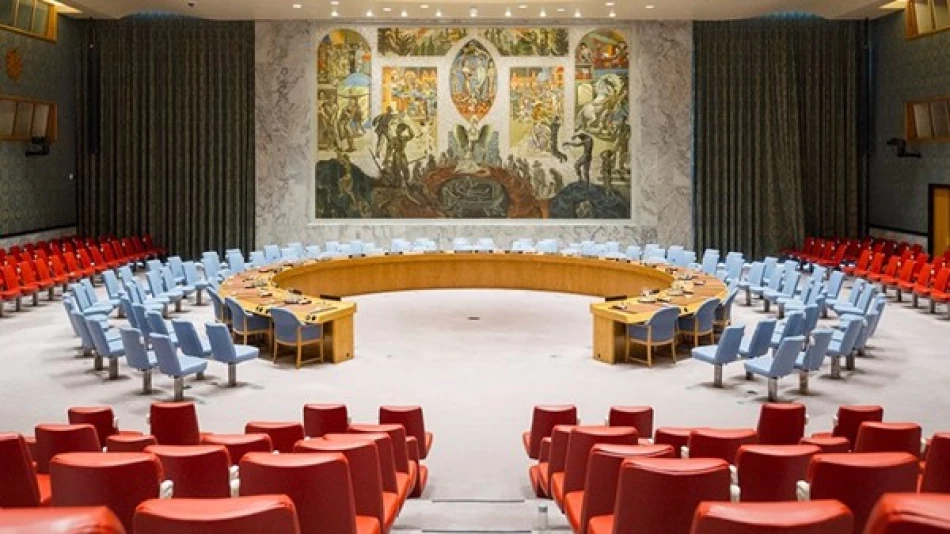
UN Security Council Explores Peaceful Conflict Resolution Strategies
UN Security Council Confronts Growing Crisis of Unresolved Global Conflicts
The UN Security Council will convene next Tuesday under Pakistani leadership to address what officials describe as an "alarming trend" of persistent global conflicts that remain unresolved due to geopolitical rivalries and diplomatic failures. The high-level session, featuring UN Secretary-General António Guterres, signals growing international concern over the breakdown of traditional conflict resolution mechanisms at a time when wars from Ukraine to Gaza continue to escalate.
Pakistan Takes the Lead on Multilateral Diplomacy
Pakistani Foreign Minister Mohammad Ishaq Dar will chair the discussion on "enhancing international peace and security through multilateralism and peaceful dispute resolution." Pakistan's decision to prioritize this topic during its Security Council presidency reflects broader frustration among middle powers with the current state of global governance.
In a memo to Security Council members, Pakistan identified three critical failures undermining international peace: escalating geopolitical rivalries between major powers, systematic non-implementation of Security Council resolutions, and insufficient use of preventive diplomacy before conflicts explode into full-scale wars.
The Breakdown of Traditional Conflict Resolution
Why Current Mechanisms Are Failing
The timing of this discussion is particularly significant given the Security Council's recent paralysis on major conflicts. Russia's veto power has blocked meaningful action on Ukraine, while US support for Israel has complicated responses to the Gaza war. Meanwhile, conflicts in Sudan, Myanmar, and Ethiopia continue with minimal international intervention.
This pattern represents a fundamental shift from the post-Cold War era when the Security Council could occasionally unite behind peacekeeping missions and diplomatic solutions. The current gridlock reflects deeper structural problems in a system designed for a different geopolitical reality.
The Cost of Diplomatic Inaction
Pakistan's emphasis on "preventive diplomacy" highlights a critical gap in current international practice. Rather than investing in early warning systems and conflict prevention, the international community typically responds only after wars have already begun—when solutions become exponentially more difficult and expensive.
Recent research suggests that every dollar spent on conflict prevention saves approximately $16 in post-conflict reconstruction costs, yet preventive diplomacy remains chronically underfunded and underutilized.
Searching for New Strategies in a Multipolar World
The session aims to evaluate current conflict resolution mechanisms and explore new strategies for addressing contemporary disputes. This reflects growing recognition that traditional approaches developed during the Cold War may be inadequate for today's complex, interconnected conflicts.
The discussion will also focus on encouraging cooperation between states and regional organizations, aligning with commitments outlined in the UN's recently adopted "Pact for the Future." This document represents an attempt to modernize international cooperation for 21st-century challenges.
The Political Will Problem
Pakistan's memo emphasizes that peace efforts ultimately depend on "political will, commitment, and cooperation from concerned parties, as well as explicit support from the Security Council." This frank assessment acknowledges that institutional reforms alone cannot solve the fundamental problem of conflicting national interests.
The challenge extends beyond the Security Council's permanent members. Regional powers increasingly pursue unilateral solutions rather than working through multilateral frameworks, while domestic political pressures often reward nationalist posturing over diplomatic compromise.
Implications for Global Governance
This Pakistani initiative represents more than routine diplomatic theater. It signals growing demand from middle powers for Security Council reform and more effective international institutions. Countries like Pakistan, which face regional conflicts but lack veto power, have strong incentives to strengthen multilateral approaches to peace and security.
The outcome of Tuesday's discussion will likely influence ongoing debates about UN reform, including proposals to expand the Security Council and limit veto powers. More immediately, it may shape how the international community approaches emerging conflicts and whether preventive diplomacy receives greater priority and resources.
Success will ultimately be measured not by the eloquence of diplomatic statements, but by whether this discussion translates into more effective international responses to the conflicts already burning across multiple continents.
Most Viewed News

 Layla Al Mansoori
Layla Al Mansoori






